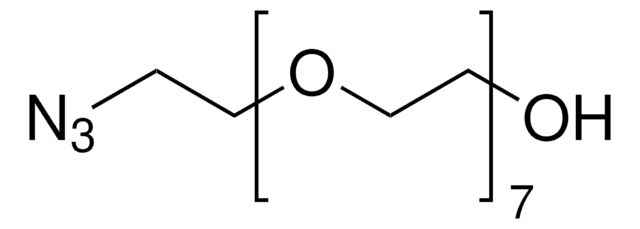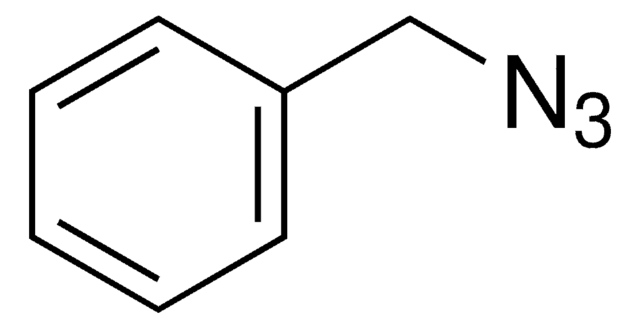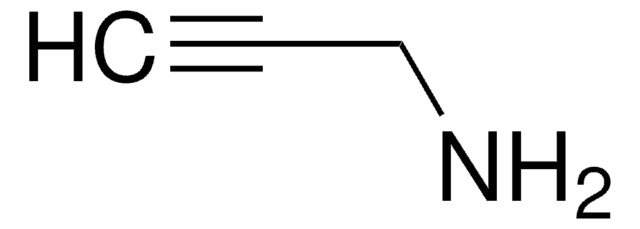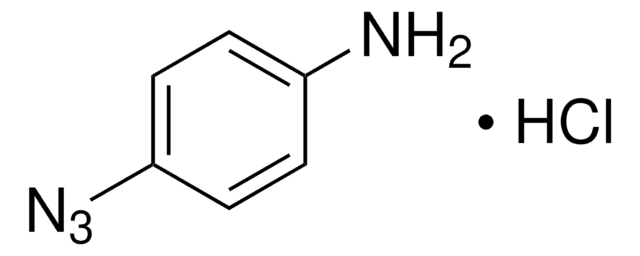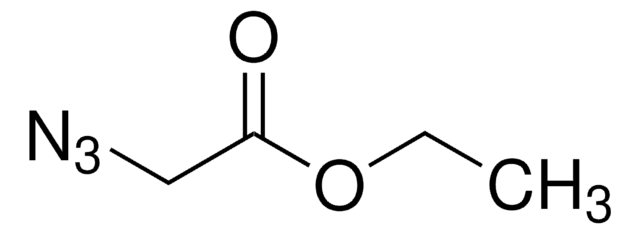776130
3-Azido-1-propanol
≥96%
Sinonimo/i:
1-Azidopropan-3-ol
Autenticatiper visualizzare i prezzi riservati alla tua organizzazione & contrattuali
About This Item
Formula empirica (notazione di Hill):
C3H7N3O
Numero CAS:
Peso molecolare:
101.11
Numero MDL:
Codice UNSPSC:
12352125
ID PubChem:
NACRES:
NA.22
Prodotti consigliati
Saggio
≥96%
Stato
liquid
Impiego in reazioni chimiche
reaction type: click chemistry
Indice di rifrazione
n20/D 1.461
Densità
1.095 g/mL at 25 °C
Temperatura di conservazione
2-8°C
Stringa SMILE
OCCCN=[N+]=[N-]
InChI
1S/C3H7N3O/c4-6-5-2-1-3-7/h7H,1-3H2
WHVSIWLMCCGHFW-UHFFFAOYSA-N
Descrizione generale
3-Azido-1-propanol is an azide-containing reagent utilized in Strain-Promoted Azide-Alkyne Cycloaddition reactions (SPAAC). This enables selective and copper-free click chemistry modifications of biomolecules.
Applicazioni
3-Azido-1-propanol is used as a:
- Precursor in the synthesis of heterocyclic compounds like dihydrooxazines
- Reagent in the synthesis of heterofunctional polyesters by 1,3-dipolar cycloaddition
Scegli una delle versioni più recenti:
Possiedi già questo prodotto?
I documenti relativi ai prodotti acquistati recentemente sono disponibili nell’Archivio dei documenti.
I clienti hanno visto anche
1, 3-Dipolar and Diels-Alder cycloaddition reactions on polyester backbones possessing internal electron-deficient alkyne moieties
M Cetin, et.al.
Polym. Chem., 7, 7094-7100 (2016)
Efficient synthesis of linear multifunctional poly (ethylene glycol) by copper (I)-catalyzed Huisgen 1, 3-dipolar cycloaddition
Liu X-M, et al.
Biomacromolecules, 8(9), 2653-2658 (2007)
1, 3-Dipolar and Diels-Alder cycloaddition reactions on polyester backbones possessing internal electron-deficient alkyne moieties
Cetin M, et al.
Polym. Chem., 7(46), 7094-7100 (2016)
Cross-linked polymer-blend gate dielectrics through thermal click chemistry
Li S, et al.
Chemistry?A European Journal, 21(49), 17762-17768 (2015)
Somayeh Khezrian et al.
Journal of biomedical materials research. Part A, 108(11), 2291-2304 (2020-05-05)
Active targeted nanotechnology-based drug delivery systems have gained significant favor because they have the ability to decrease side effects, improve drug bioavailability, and the potency of anticancer treatment. In this study, functional amphiphilic Janus nanoparticles (JNPs), consisting of hydrophilic and
Il team dei nostri ricercatori vanta grande esperienza in tutte le aree della ricerca quali Life Science, scienza dei materiali, sintesi chimica, cromatografia, discipline analitiche, ecc..
Contatta l'Assistenza Tecnica.
![2-[2-(2-Azidoethoxy)ethoxy]ethanol solution ~0.5 M in tert-butyl methyl ether](/deepweb/assets/sigmaaldrich/product/structures/374/007/eea7ca74-41e4-4aac-af71-c93c37ec0a5a/640/eea7ca74-41e4-4aac-af71-c93c37ec0a5a.png)




